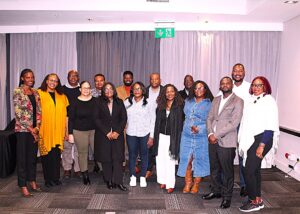Silence Charumbira
The Embassy of the People’s Republic of China on Tuesday launched the Confucius Institute of Agricultural Science and Technology (CIAST) which will be housed at the National University of Lesotho (NUL).
The institute is the culmination of a partnership between the NUL and Chinese universities, Jilin Agricultural University and Tonghua Normal University.
Addressing guests at the embassy on the night, Lu Hui, the Chargé d’Affaires of the Embassy of the People’s Republic of China in Lesotho, said the Institute was one of the deliverables of Prime Minister Sam Matekane’s visit to China last September.
“Last year, Prime Minister Matekane attended the Beijing Summit of the FOCAC. The establishment of the first Confucius Institute in Lesotho featuring “Agricultural Science and Technology” was listed as one of the important achievements of his visit,” Mr Lu said.

(third from the right).
“This Confucius Institute is the only one among the more than 500 institutes worldwide featuring “Agricultural Science and Technology”. In just half a year, it will officially open, becoming a highlight in the cultural and agricultural exchanges between China and Lesotho.”
He said Confucius was a great representative of Chinese culture and his wisdom and thoughts have transcended time and space, influencing countless countries and nations. As a bridge for educational exchanges and a platform for cultural mutual learning, Confucius Institutes have promoted understanding and friendship among people of different countries.
“Last year marked the 20th anniversary of the establishment of Confucius Institute. Over the past 20 years, Confucius Institute has witnessed international challenges and achieved remarkable accomplishments. Since the signing of the agreement to establish the first Confucius Institute in Africa at the University of Nairobi in Kenya in 2004, a total of 77 Confucius Institutes and Confucius Classrooms have been established in 47 African countries.”
Mr Lu said in April 2017, the Experimental High School of Changchun and Machabeng College International School of Lesotho signed an agreement to establish the first Confucius Classroom in Lesotho. He said it had taken eight years from the first Confucius Classroom to the first Confucius Institute of Agricultural Science and Technology at the NUL.
He said the signing of the agreement for the CIAST on the 20th anniversary of the establishment of the institute and its official opening on the 80th anniversary of the NUL were inseparable from the joint efforts of the three universities.
“They are also a testament to the deepening friendship between the people of China and Lesotho and a symbol of the determination of both countries to jointly promote education and cultural exchanges.”

Last year, the leaders of China and Lesotho reached concern to upgraded the bilateral relationship to a strategic partnership, and China-Africa relations were upgraded to an All-Weather China-Africa Community with a Shared Future for the New Era, he said. In the face of global challenges such as unilateralism, power politics, development deficits and climate change, China and Lesotho, as well as China and Africa, must stand together.
He said the values advocated by Confucius, such as “benevolence, people-oriented governance, integrity, justice, harmony and great unity”, coincide with the concepts of building a community with a shared future for mankind and King Moshoeshoe I’s founding ideology of “peace and benevolence”, and still has practical significance and contemporary value that transcends time and space.
In an era where the South is rising and great changes were taking place, “we hope that the Confucius Institute of Agricultural Science and Technology may serve as an important platform for integrating Chinese and Lesotho cultures”.
Under the guidance of the thoughts of Confucius, all parties can carry forward friendship, support each other, seek common development and stay focused to enrich the connotation of the China-Lesotho strategic partnership, he said.
Guest of honour, Education minister, Professor Ntoi Rapapa, said the launch came at an opportune time when the NUL was also celebrating its 80th anniversary. The occasion had “reminded us all that the university’s enduring legacy and its critical role in shaping the future of our nation”.
“It is fitting, therefore that on this same day, we witness another landmark achievement – one that signals a new era of international collaboration and academic advancement,” Professor Rapapa said.
The CIAST Science and Technology, established through the support of the Chinese government, represents a powerful partnership that will go a long way in diversifying the university’s academic research programs. This collaboration is not only timely but also strategic. It comes at a moment when our nation, like many others, faces increasing climate-induced challenges – challenges that threaten our agricultural productivity, our food systems, and the livelihoods of our people.
He said the institute would serve as a platform for the exchange of knowledge, skills, and innovation. It would also equip students, researchers, and farmers with practical tools and modern techniques to improve productivity, adapt to climate change, and ensure long-term food security, he said.

We believe that education and technology are key to building a resilient and self-sufficient Lesotho. With the support of partners such as the People’s Republic of China, we are confident that our education system will continue to evolve to meet the pressing demands of our time.
Prof Rapapa said learning Chinese was also critical for Lesotho and the government would find mechanisms to introduce it into the Lesotho education system. It would initially be a pilot project before it is mainstreamed since there is a desire to learn the language.
The institute would help local students adapt to climate change and ensure food security. While Lesotho grows some of its food, it also imports food, the Confucius Institute would help the country become self-sufficient.
Prof Rapapa said Lesotho’s Universal School Feeding Program would also benefit with the hope of increasing the number of meals for the learners.
“We also have…the Universal School Feeding Program…where we are feeding 300 000 kids one meal per day as a minimum (sic) and with (anticipated) agricultural production, I think we will be able to assist in the school feeding program,” he said.
Financial constraints deter the government from supplying adequate meals for learners and success of the CIAST could boost the government’s capacity.
More from Africa News 24
He said the Education ministry was also planning to establish information communication technology (ICT) laboratories that would be accessible to a large number of students across all tertiary institutions starting with NUL. This would bridge the ICT access deficit in tertiary institutions.
While the gap was worse in the lower levels of education, it was important to start somewhere, he said. The CIAST would therefore play a major role in terms of mobilising laboratories and equipment.
With an excess of 10 000 students, the NUL was in dire need for infrastructure like halls and theatre as its current hall can barely house 300 students.
The support afforded to Lesotho by China in the education sector was “creating a more resilient, lucrative and capable society that is able to address the challenges of the 21st century”.












